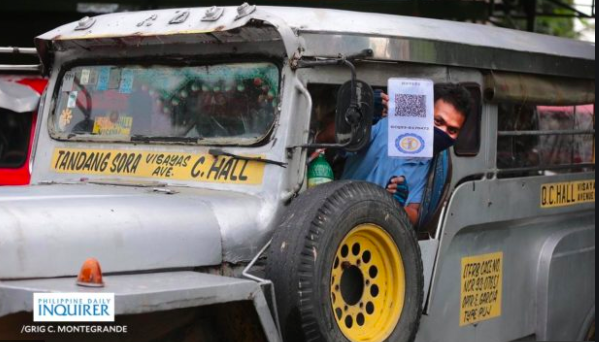MANILA, Philippines — The shrink in the country’s economy could have been eased had the government allowed public transportation to operate safely during the quarantine period, said Vice President Leni Robredo.
Robredo on Sunday, who insisted that while bad gross domestic product (GDP) numbers were unavoidable, it should not have been this bad especially as the -16.5 percent contraction is the worst in the Southeast Asian region.
“Iyong negative 16.5% grabe iyan. Parang kung hindi ako nagkakamali […] parang ang epekto noong pagkawala ng public transport, parang nasa 52%? Napakalaki noon. Ito iyong parati nating sinasabi na sana noong nag-GCQ tayo, puwede na sana iyong public transport doon. Ayusin na lang. Siguraduhin na mayroong social distancing,” Robredo said in her radio program.
(The negative 16.5 percent is just bad. If I am not mistaken, the effect of the public transportation ban on the economy was around 52 percent? That is big. It reflects what we have been saying that when we were at a GCQ, we could have allowed public transport then. Just fix it, ensure that there is social distancing.)
“Ayusin na iyong pinaka-maliliit na drivers nakakapagbiyahe na lalo na iyong mga jeepney drivers. Sana ayusin kung papaano makaka-observe ng social distancing using jeepneys kasi marami talagang apektado. Nakakalungkot kasi iyong sa mga ASEAN countries, tayo iyong pinakamalala,” she added.
(Fix the system so that small operators and drivers can make trips, especially jeepney drivers. I hope they find a way to observe social distancing using jeepneys because a lot of people are affected. It is saddening to know that of all ASEAN countries, we have the worst economy.)
Last Thursday, the government admitted that the country’s economy shrank by 16.5 percent just in the second quarter of 2020, which meant that the country has already fallen into recession.
READ: Officially a recession: PH GDP shrank 16.5% in Q2
Robredo, a long advocate of letting public transport operate again in areas under the general community quarantine (GCQ), earlier asked the government not to use the pandemic as an excuse to phase out traditional jeepneys.
After Metro Manila transitioned from a modified enhanced community quarantine (MECQ) to a GCQ last June, new and old jeepneys, along with UV Express vehicles were initially barred from resuming operation. This however left many commuters stranded, disregarding physical distancing regulations just to get a ride to and from their workplaces.
READ: ‘Puno na lahat:’ Metro workers brave lack of public transport, rains on Day 1 of GCQ
The Land Transportation Franchising and Regulatory Board (LTFRB) on June 21 allowed modern jeepneys to resume operations but barred traditional jeepneys and UV Express units as the government said these vehicles violate physical distancing protocols.
READ: Modern jeepneys to resume operations in 15 NCR routes on Monday, June 22
Think-tank organization Ibon Foundation however refuted the LTFRB, saying that studies show that coronavirus transmissions are more likely in enclosed areas with air conditioning systems. Ibon also noted that jeepney drivers have likely lost around P78,000 worth of income due to the lockdowns.
READ: Traditional jeepneys likely to be safer from virus spread than air-conditioned ones – Ibon
READ: Current jeepney ban means P78,000 income loss to drivers, says Ibon Foundation
Eventually, traditional jeepneys were allowed to resume operations in various parts of Metro Manila, but these came just weeks — and in some instances, just days —before the National Capital Region, Bulacan, Rizal, Cavite, and Laguna reverted back to an MECQ as COVID-19 cases rise.
READ: 6,000 jeepneys return on 49 Metro Manila routes July 3
READ: LTFRB gives go signal for 1,943 jeepneys to resume operations
The Vice President noted that while there are efforts to correct problems with the economy and with the healthcare system — as what health workers have recently complained of — the solutions are coming at a slow pace.
“So sana, mapatama na iyong pag-deal with this. Kasi kung napatama sana maaga pa, hindi ganito ka-grabe. […] May mga ginawa na ang hinahanap nating from the very start na plano, pero mabagal talaga,” she added.
(I hope they find correct ways to deal with this. Because if they did things right from the start, we should not be faced with a grave situation. They are doing things we are looking for, but it has been slow.)
